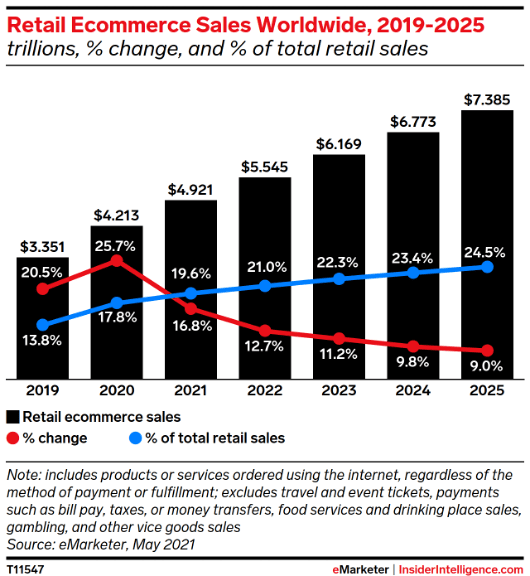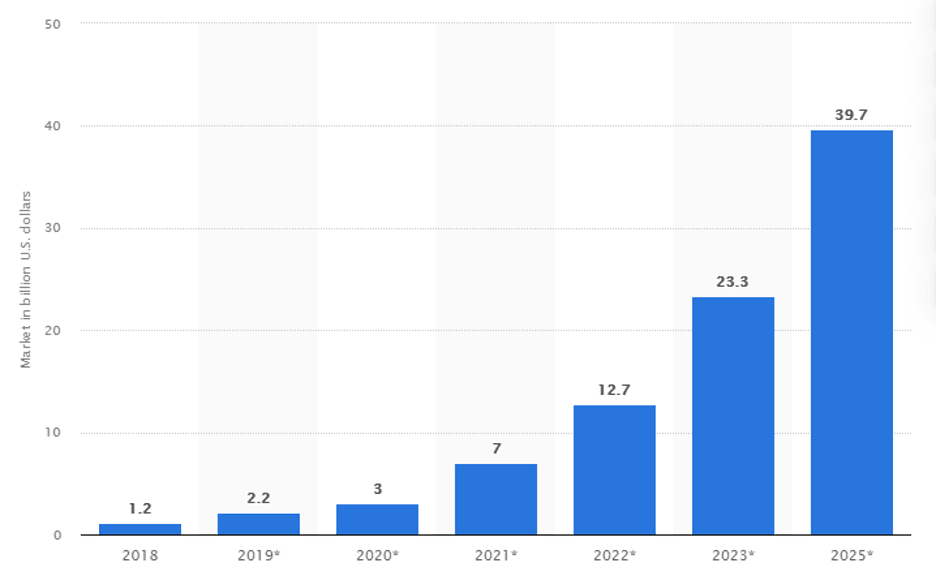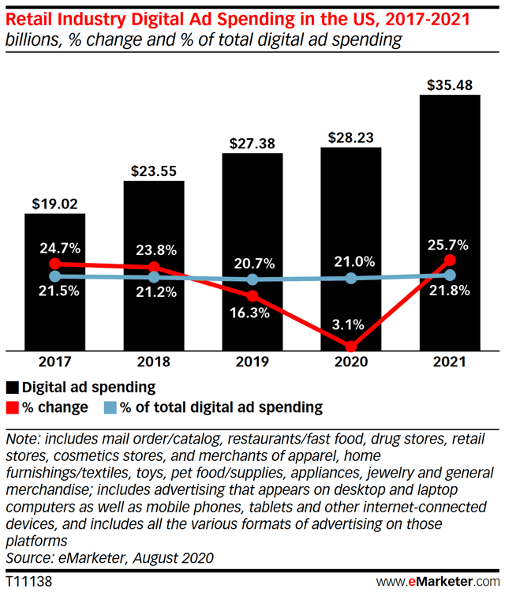Marketers spend a lot of time and money trying to reach their ideal customers. They use a variety of techniques and tools to get them to notice and engage with their brand. However, digital and traditional marketers have varied approaches to reaching their goals.
With eCommerce shopping sales on the rise and forecasted to reach $7.385 trillion in 2025, taking your brick-and-mortar business online seems inevitable. The balance between offline and online retail can be tricky but is beneficial for long-term strategies.
The blockchain market size is expanding rapidly as well. Experts predict that it will rise at a compound annual growth rate of 67.3% from $3 billion in 2020 to $39.7 billion in 2025. This growth is largely attributed to the thriving popularity of this technology in retail and supply chain management.
Blockchain and eCommerce are upcoming trends, and as a result of their widespread usage, they will never be seen as fads. Blockchain technology has created a wave of hype in the market by encouraging the use of technology in various industries. eCommerce is an industry having immense potential that has gained lots of attention from blockchain enthusiasts.
Read on to find out how you can improve your marketing strategy through these exciting industries.
Building Credibility Through Transparency
Retailers, offline as well as online, are designing their business models transparently. They do this with consistent pricing structures, detailed refund policies, and order fulfillment technology. Both eCommerce and blockchain contribute to building online credibility with your in-store customers through their respective attributes.
Approximately three-quarters of consumers are willing to pay a higher price to associate with brands that provide complete transparency. eCommerce provides a platform to exhibit such transparency outside your physical stores. You can integrate transparency into your brand’s marketing strategy by putting forth an honest narrative.
Convey Your Brand Story
The users are drawn to your brand’s narrative when you keep it authentic and meaningful. You can aim at scaling your marketing plans by conveying how your product can make a difference and why you ardently believe in its efficacy.
Online eCommerce stores allow you to make the most of relationship marketing. Cultivate a lasting relationship with your existing customers by publishing content that they love, seeking their feedback, and building a loyal online community.
Your website acts as an extension of your physical presence and the familiarity between online and offline marketing establishes trust amongst your audience and encourages them to interact with your brand.
Gain Control Over Data
The decentralization of the data through blockchain delivers numerous interesting opportunities. The technology offers a flawless method to look into data integrity and audit trails as it identifies the origin of the details via its linked chains.
The integration of blockchain into retail comes as a relief for consumers as well. It possesses properties that incentivize engagement from the users. The personal data, thus collected, is used securely and permitted according to the user’s preferences. Be ready for data reporting tool changes on the horizon as well—specifically, the Google Analytics move to GA4 to ensure you really control your data and can use it effectively.
Increase Return on Ad Spend
The retail industry has a wide scope for scaling its marketing strategies with digital ads. Adding eCommerce to the mix of a professional website and creative digital ads steps your marketing game up a notch.
Clickable digital ads send the user directly to your eCommerce landing pages. This is an upgrade to the traditional advertising methods because here, the marketer has the opportunity to capitalize the moment the consumer expresses a desire to purchase.
Shoot your conversion rates with digital ads that reach your customers at the right time and place. You can observe an increased budget for digital advertising in the retail sector. This can be utilized by implementing appropriate strategies like Search Engine Optimization (SEO) and Pay Per Click (PPC) campaigns to scale your marketing into the online arena with eCommerce at its core.
Use Search Engine Analytics
The eCommerce website can bring forth valuable insights for several data points. Search engine analytics help curate an in-depth customer profile and understand the customer journey.
Try out different methods of social media marketing and offer click-and-collect services. Track the user response through analytics and modify the plans accordingly.
You can use these outcomes to build informed marketing campaigns. Alongside employing automatic insight generation for successful targeting, data can be coupled to a hyper-personalized section of insight generation. Examples include localized ads that aim at increasing footfall or aggressive bidding on high-value customers via media campaigns.
Exercise Advanced Targeted Marketing
The footfall in your brick-and-mortar store can give you generic ideas about the target audience. Whereas the search engines operate on algorithms that can track data of the clicks and visits. These can help you etch out a refined buyer persona. You can reach your target audience using keywords and identifying search intent.
Blockchain is on par with eCommerce and has launched targeted mobile ads and campaigns for several users. Targeted marketing performs better than mass marketing, wherein the users do not experience any personalization.
Blockchain is mastering the art of helping your effort reach the appropriate audience and not as an unsolicited disturbance to the people who are not interested. Using tactful boundaries of using the data provided by the consumers according to their preference is the key to reaching maximum genuine leads here.
Amplify Security
Over the next ten years, the global cost of ad fraud is expected to rise to $50 billion (£35 billion). As a result, the industry must turn to new technology to develop a solution that combats global ad fraud while also giving businesses complete control over their ad expenditure.
A blockchain-based platform can encourage advertising industry stakeholders to work in an open, collaborative atmosphere where everyone is honest and trustworthy. End-to-end transparency can be achieved for online advertising-related operations such as click authentication.
Campaign audits and near-real-time impression tracking are available to ad space users. Blockchain helps advertisers manage their budgets by removing unnecessary advertising and better managing data click impressions and profits for each website linked to the system.
Use Smart Contracts
Financial transactions cost a lot of money nowadays. Payment processing fees of 3% are commonly paid by retailers to credit card issuers. On payment services like PayPal, consumers pay transaction fees, while businesses pay listing and sales fees on eBay and Shopify. All of these fees add to the cost of goods, which is typically passed on to customers.
To combat this, marketers can use blockchain technology for “smart contracts”. These are virtual agreements that eliminate the requirement for intermediary validation, inspection, or authentication. In addition, these contracts are tamper-proof, eliminating the possibility of an external unauthorized attempt to access your company’s official documents.
These are computer protocols for facilitating, confirming, or enforcing contract negotiations or performance over the internet. Smart contracts enable the execution of trustworthy transactions without the involvement of a third party. Micropayments also reward customer engagement, as well as smart contracts between agencies and firms, which have the potential to revolutionize marketing.
Creating and implementing smart contracts successfully takes expertise, and you can acquire this quickly at an intense Solidity bootcamp that empowers you with the skills you need to maximize the impact of this tech.
Future-Proofing Your Business
You future-proof your retail business with an omnichannel marketing strategy with your physical stores, eCommerce website, and social media platforms. The eCommerce experience can be cultivated to generate an engaging interaction with the brand even when the store is physically closed. You can then use ecommerce analysis to understand everything you need to know about your target audience to better market to them in the future.
There are lots of advancements in this arena backed by Artificial Intelligence, Machine Learning, and Natural Language Processing that allow you to personalize the service for every customer. Leverage these trends and move forward with agility. They will lead to scaling your marketing technique as well as the brand as a whole.
Blockchain as a technology is controlled by a group of users and not a single unit making it a decentralized database. The system’s data is protected by encryption. It can’t be changed or removed. According to blockchain theory, any file or data can be stored in chain blocks.
The technology is used in multiple fields. Business transactions, financial information, and health records are all permanent in the blockchain system. As a result, for industries like advertising, blockchain offers a fresh, transparent, and secure tool.
The popularity of cryptocurrencies has begun to increase and people are looking forward to transacting via the best bitcoin exchanges. eCommerce engagement provides an appropriate opportunity as it is well on the course of becoming a part of the user’s everyday life.
Wrapping up
If you want to improve your marketing, you need to ensure that you are using the latest technology to reach your customers. Blockchain is the technology that is set to take over the world, and with it, eCommerce platforms are now able to scale to levels never seen before. With this technology, you can now reach your customers anywhere in the world, with no limitations.
If you’re thinking about scaling your marketing, then eCommerce is an area you should consider. The two technologies are already partners, and the relationship is only getting stronger. When you use blockchain, you can take advantage of eCommerce’s ability to track transactions, improve supply chain management, and more.











0 Comments